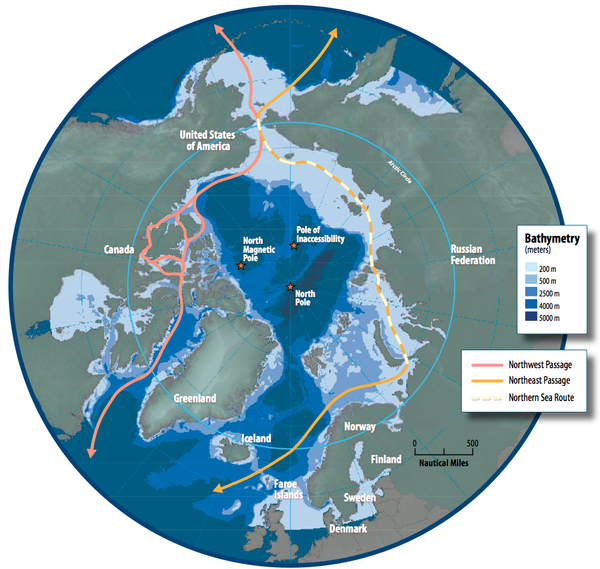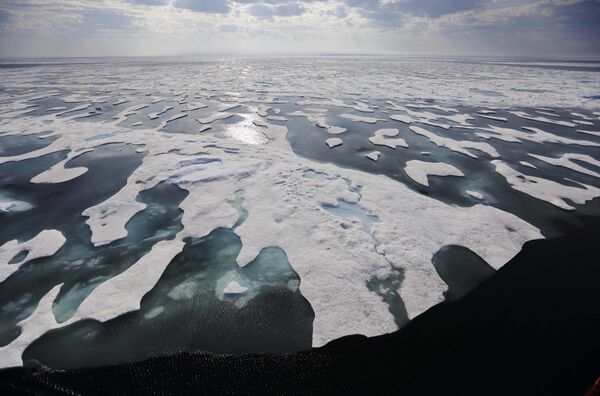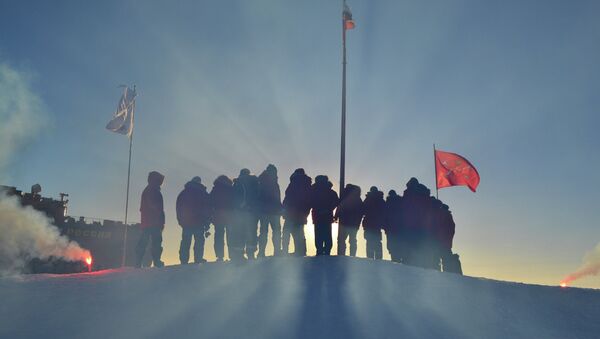Climate change opens tremendous new opportunities for Russia to strengthen its position in the international arena, Haaretz writes.
Russia, the newspaper notes, benefits from its favourable geographical position near the Arctic Circle, where geologists have estimated up to 30 percent of the world’s natural gas and 13 percent of its oil reserves are situated, trapped under the Polar ice. As the Arctic permafrost melts, these resources will become more accessible, particularly to Russia, which has staked out a large portion of the Arctic by showing that the Lomonosov Ridge is an extension of its maritime borders.
Furthermore, Haaretz suggests, changing temperatures are making the waters along the coast of the Russian Arctic territories less hazardous than before, and making the idea of new trade routes through the Arctic Ocean more promising, with countries with ports in the North and Baltic Seas standing to benefit – Russia in particular.
According to one “extreme scenario” found in a 2014 UN report cited by the newspaper, in a situation where Arctic maritime routes are capable of operating ice-free year round, as much as “two-thirds of the trade that passes through the Suez Canal would be diverted to the new shipping routes. In any event, the melting of Arctic icebergs will increasingly open up commercial routes from Russia’s northern shores to East Asia, with vast implications for global trade,” the newspaper notes.

Specifically, not only can a large part of Chinese exports to Europe be shipped along the Russian Arctic route, but Russia itself, hindered for centuries by the lack of a saltwater port that’s ice-free year-round, would finally receive such ports, potentially “giving Moscow an advantage over Western competitors.”
In Haaretz’ perspective, Russian policy in the Arctic, which has included beefing up the region’s defences and laying out a comprehensive strategy for economic development and investment, including tax breaks, the construction of all-new ports, the creation of a new railway line, a new satellite navigation standard specifically for Arctic use, etc. is all “part of a larger Russian scheme designed to challenge the global trade map as it is being drawn via policy decisions by the West, spearheaded by the United States.”
All this means that even if Russian President Vladimir Putin “doesn’t have the quantity of resources possessed by his superpower neighbour to the east…the rabbit in his hat is global warming itself. Beyond the new trade routes that could open up, Russia will also profit in another way from the planet’s warming: accessibility to land for agricultural production,” the paper stresses.

Arctic Opportunities
The Arctic prospects and challenges for Russia and its potential competitors has become a major topic of discussion in foreign think tanks and media outlets in recent years. Late last month, for example, the United States Army War College issued a report warning that the melting of Arctic ice served as the main “threat” posed by Russia to US global supremacy, with the Arctic itself becoming a potential “new theatre of direct military contact” between the two countries.
To try to deal with this ‘problem’, US policymakers have already sought to expand their own presence in the region, including via new NATO bases in Arctic countries like Norway aimed at “keeping an eye on” Russia’s Arctic activities, the building of new icebreakers, the increased deployment of US warships in the area for drills, and even a bizarre attempt by President Trump earlier this year to try to convince Denmark to ‘sell’ Iceland to the US.
Earlier this year, speaking at the International Arctic Forum in St. Petersburg, after listing Russia’s efforts to develop the region, President Putin emphasised that in addition to opportunities, the Arctic presents the world with “immense challenges.” These, Putin stressed, could be responded to effectively only if regional countries worked together.
“One such challenge, as I have told you, is to maintain balance between economic development and the preservation of the Arctic environment, conservation of its unique and fragile ecosystems, and, of course, clean-up of the environmental damage accumulated through the economic activity in the past decades,” Putin said.
Russia, the president added, is already doing its part and, “starting in 2012, we have removed and recycled over 80,000 metric tonnes of waste.” Putin confirmed that in the coming years, Russia will clean up six major environmental damage sites, and develop new special, environmentally protected areas and nature preserves, above all via the Russian Arctic National Park initiative.


